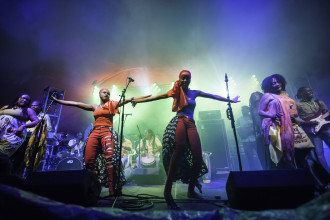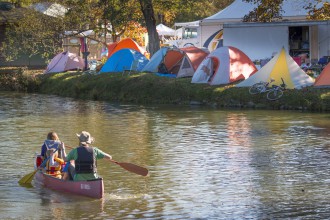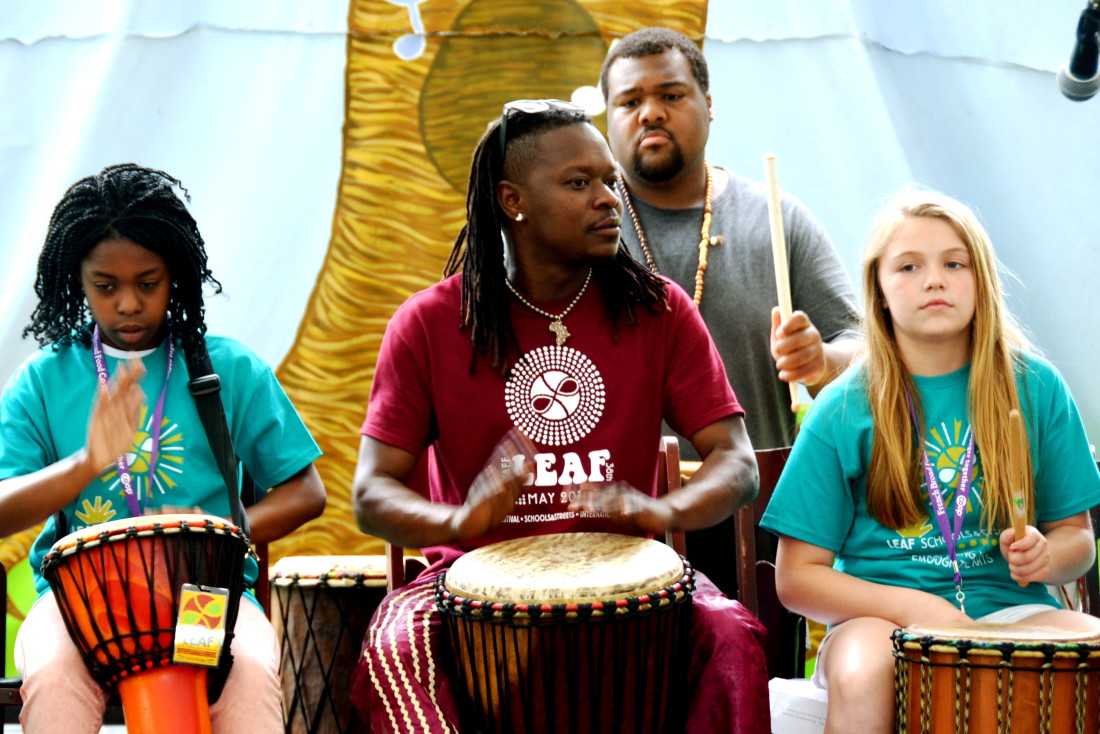How do you sum up 20 years of festivals? That’s two decades of twice-yearly campouts, dances, new musical discoveries and fond favorites; of friends made and family bonds strengthened; of campfire hangouts and sunny-day revelry.
For LEAF, which is celebrating its 20th anniversary this May, “It’s expressed in the theme: ‘Global Gratitude,’” says Jennifer Pickering, the festival’s founder and executive director. “LEAF has been one of these creations of so much love, so much energy, so many ideas and visions. The reality is it only comes to life because so many generous people come together in so many different ways.”
That collective effort may be what keeps the event going strong even as a number of other local festivals — from long-running endeavors like Bele Chere to recent additions like Mountain Oasis — have called it quits. LEAF nearly sells out each year, and attendance has grown from 1,200-1,500 in the early going to as many as 6,000 on-site per day. Furthermore, Performing Arts Director Ehren Cruz reports that the organization is on track to achieve record ticket sales this season.
More than music

Far from resting on their laurels, however, LEAF’s organizers are beefing up two ancillary programs, LEAF Schools & Streets and LEAF International, while announcing a host of new local events (including concerts, a downtown Asheville festival and a “funk camp” with Bootsy Collins — see sidebar for more info).
Meanwhile, the upcoming spring festival promises more than 80 roving performers, 10 artist installations (ranging from art cars to the jelly dome), and seven “kids villages.” Plus, “We’re bringing out artists from 30 different countries,” says Cruz. Lágbájá, a Nigerian Afro-beat group, will be making its first U.S. visit; headliner Xavier Rudd fronts an eight-member band that includes musicians from Papua New Guinea, aboriginal Australia, Germany, France and South Africa. “That band really reflects the cultural traditions we’re trying to represent,” says Cruz.
LEAF aims to create an overarching experience, so ticket buyers don’t come just for a big name act or two. Instead, festivalgoers get to hear an array of sounds ranging from the familiar to the exotic. “World music is a challenging music to promote. It doesn’t get as much of the corporate buzz,” says Cruz. “But for LEAF, the emphasis is on world music as cultural preservation.”
Another thing that sets LEAF apart, says Pickering, is that “it’s a limited-sized event, but the reach goes way beyond.” Thanks to LEAF International, launched in 2006 with a program in Bequia (an island in the Grenadines), art and music are changing lives in 10 countries. The newest program is in Costa Rica; the largest is in Panama, where more than 250 young people — many of them orphans — have been given the opportunity to attend music camps and workshops.
The program in Rwanda began with the invitation of LEAF festival performing artist Jean Paul Samputu. Through drumming classes, that partnership reached out to 25 children who were living on the street due to the 1994 genocide and the AIDS epidemic. Soon, the organization provided housing for those students, who formed the LEAF Intore Cultural Troupe. Today, members of the collective tour the world.
Meanwhile, a contingent from the Costa Rican program will perform at the May festival. “Our hope is to give people that connective moment,” says Cruz. “When you’re visiting our international programs, you see how much music and art is not just a hobby, it’s woven into the cultures in a deep and powerful way.”
He adds, “LEAF is not just about watching awesome stuff happen onstage. It’s about what you can take home into your life, to share art with your family and your community.”
Home is where the art is

Gathering inspiration from Canadian folk artists, classical Indian performers, Malawian drummers or Ugandan roots musicians — all of whom are featured on this spring’s roster — is exciting. But the real spirit of LEAF extends to local neighborhoods as well. That’s part of the idea behind LEAF Schools & Streets, the educational arm of the nonprofit. Seeking to “empower children, their families and communities through cooperation and performances,” the program provides in-school and after-school art and music instruction.
The culmination of those efforts plays out onstage at LEAF. “You recognize the life-changing capability of the performances that the youth do, and you see the kids [from] residencies who were really shy, [who] get to the festival and shine,” says Jocelyn Reese, the program’s director. “Seeing the process come together in the performances is really awesome.”
Reese joined the LEAF team three years ago. Having previously served as an assistant principal for Asheville City Schools, she sought to strengthen school partnerships. On Reese’s watch, the LEAF Schools & Streets initiative has doubled, from 12-15 programs per year to over 25-30 annually. Launched by Pickering in 2004, LEAF Schools & Streets targets kids who lack access to the arts.
Over the last decade, says Reese, Asheville has changed. And “our understanding of the needs within the communities has deepened.” But at the same time, she stresses, “We try not to ever approach a community and say, ‘What you need is … .’ Them coming to us is the best way, and then we say, ‘Yes.’”
Different is good

“When I created LEAF, I really wanted it to be where you got to step into this place that allowed you to sample all these different experiences and do this among so many different types of people from different communities,” says Pickering. “You start to unintentionally build bridges.” To fully achieve that ambitious goal, however, the festival director realized that she and her crew had to start building bridges intentionally.
Accordingly, says Pickering, creating welcoming spaces is part of LEAF’s belief system. “It’s a piece of our local community in which LEAF is dedicated to playing a positive role. Through the music and arts, we believe you can break down a lot of isms and misunderstandings.”
But even when the objective is a weekend’s worth of fun, there are barriers to overcome. Many people, says Pickering, simply don’t camp — yet the reality is that camping is a large part of LEAF festival. She cites a visit from LEAF International partners from Haiti and Rwanda who were shocked to see the tents, which they associated with refugee camps. Closer to home, there are also Western North Carolina residents — including students in LEAF Schools & Streets — for whom sleeping under the stars is an alien experience. As a part of the program’s funding, a number of families are sponsored to attend the festival. “This is our mission in action,” says Communications Director Cortina Caldwell. “We’re building a model to integrate those families into the festival world. When those kids get up onstage and perform, it’s a true moment of pride for them and for their families.”
And if that’s not precisely what Pickering imagined when she started LEAF 20 years ago, it’s certainly close. Back then, the owner of the Black Mountain Folk Festival, which was also held at Lake Eden, approached Pickering about taking over his event. She had just moved back to town and didn’t know anything about festivals, but she’d grown up on the property and liked the idea of using it as a vehicle for exploring different cultures. Instead of taking over the existing event, however, Pickering followed her own evolving vision and started LEAF. Two decades later, new campers are being minted, and a generation of children (some now young adults) can claim they grew up there.
Still, at its heart, the festival remains rooted in simple pleasures. “What the press wants to talk about is who’s playing, but that’s such a small portion of the LEAF experience,” says Pickering. “It becomes more and more precious, as our lives become more busy, to be out in nature and take time to sit around with friends. To just be there.”
WHAT: LEAF, theleaf.com
WHERE: Lake Eden in Black Mountain
WHEN: Thursday, May 7, to Sunday, May 10. Tickets are sold only in advance; prices are as follows: weekend pass (Friday-Sunday, including camping) $168 adults/$142 kids ages 10-17; community pass (Friday-Sunday, no camping) $112/$99; Friday evening or Sunday day pass $50/$40; Saturday day pass $60/$53. Parking $5 per vehicle, free shuttle to festival




Before you comment
The comments section is here to provide a platform for civil dialogue on the issues we face together as a local community. Xpress is committed to offering this platform for all voices, but when the tone of the discussion gets nasty or strays off topic, we believe many people choose not to participate. Xpress editors are determined to moderate comments to ensure a constructive interchange is maintained. All comments judged not to be in keeping with the spirit of civil discourse will be removed and repeat violators will be banned. See here for our terms of service. Thank you for being part of this effort to promote respectful discussion.